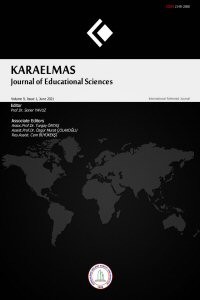Argümantasyonun Elektrikteki Kavramsal Anlama Üzerine Etkisi
Öğretmenin tek taraflı bir şekilde kendi bildiği doğruları öğrencilere yüklemeye çalıştığı bir öğrenme ortamından ziyade dialojik etkileşimin arttığı ve bu yolla kavramsal değişimin daha kalıcı izli olduğu bir öğrenme ortamı sağlayan argümantasyon, son yıllarda fen eğitimi araştırmacıları tarafından sıklıkla kullanılan bir öğretim metodudur. Bu çalışma, Fen bilimlerinde hem öğretilmesi hem de öğrenilmesi aşamalarında kavramsal boyutta güçlüklerle karşılaşılan fizik alanında ve özellikle elektrik konusunda bir öğretim metodu olarak argümantasyon kullanılmasının; Fen Bilgisi öğretmen adaylarının kavramsal anlama durumlarına etkisini incelemeyi amaçlamaktadır. Çalışma sonunda, argümantasyonun tespit edilecek etkileri göz önünde bulundurularak bir öğretim metodu olarak nasıl uygulanması gerektiği konusunda araştırmacıların tecrübe kazanmaları hedeflendiği için bu çalışma, keşif çalışması olarak tasarlanmıştır. Çalışma kapsamında “Yıldırım” konusunda “Yarışan Teoriler” ile “Lambaların Parlaklığı” konusunda “Tahmin-Gözlem-Analiz” aktiviteleri olarak düzenlenen 2 pilot uygulama, Abant İzzet Baysal Üniversitesi’nde Genel Fizik II dersine devam eden Fen Bilgisi öğretmen adayları ile yürütülmüştür. Veri toplama aracı olarak “Bireysel-giriş, Grup tartışması, Tüm-sınıf tartışması ve Bireysel-son” olarak isimlendirilen 4 bölümden oluşan argü-formlar kullanılmıştır. Yapılan analizler sonucunda, katılımcıların hem yıldırım hem de lambaların parlaklığı konularındaki aktivitelerde argümantasyon süreci boyunca, iddialarının ve iddialarına yönelik sundukları gerekçelerinin bilimsellik düzeylerinde artış gözlemlenmiştir. Benzer şekilde, katılımcıların argümantasyon sürecinde dialojik etkileşimleri artırmak için yapılan grup ve tüm-sınıf tartışmalarının, katılımcıların hem yıldırım hem lambaların parlaklığı konularındaki kavramsal anlamaları üzerindeki olumlu etkileri, yapılan analizler sonucu ortaya çıkarılmıştır
Anahtar Kelimeler:
Argümantasyon, Kavramsal anlama, Elektrik
The Effect of the Argumentation on the Conceptual Understanding of Electricity
Argumentation is a teaching method that has been frequently used by science education researchers in recent years and provides a learning environment in which the dialogic interaction increases. In this way the conceptual change is more persistent rather than a learning environment in which the teacher unilaterally attempts to transfer his/her own truths to the learners. This study aims to examine the effect of using argumentation as a method of teaching in the field of physics, specifically focusing on the topic of electricity, which is encountered with difficulties at conceptual level both during teaching and learning in science on conceptual understanding of pre-service science teachers. This study was designed as an exploratory study because it is aimed to gain experience of researchers as to how to implement the argumentation as a teaching method considering its effects to be determined at the end of the study. In the scope of the study two pilot studies which were designed as “Competing Theories-Ideas and Evidence” activity on lightning and as “Predicting-ObservingExplaining” activity on brightness of lamps were conducted with pre-service science teacher who enrolled in the General Physics II course at the Abant Izzet Baysal University. Argu-forms consisting of 4 sections called "Individual-entry, Small-group discussion, Whole-class discussion and Individual-last" were used as an instrument. According to the analysis of the data, scientific level of participants' claims and of participants' reasoning for their claims increased during the argumentation process in the activities of both lightning and the brightness of the lamps. Similarly, the positive effects of small-group and whole-class discussions, designed to increase the dialogic interactions in the argumentation process, on the participants’ conceptual understanding of both concepts were revealed by the analysis of data
Keywords:
Argumentation, Conceptual Understanding, Electricity,
___
- Asterhan, C. S., & Schwarz, B. B. (2007). The effects of monological and dialogical argumentation on concept learning in evolutionary theory. Journal of Educational Psychology, 99(3), 626.
- Berland, L. K., & Hammer, D. (2012). Students’ framings and their participation in scientific argumentation. In Perspectives on scientific argumentation (pp. 73-93). Springer Netherlands.
- Bricker, L. A., & Bell, P. (2008). Conceptualizations of argumentation from science studies and the learning sciences and their implications for the practices of science education. Science Education, 92(3), 473-498.
- Cavagnetto, A. R. (2010). Argument to Foster Scientific Literacy A Review of Argument Interventions in K–12 Science Contexts. Review of Educational Research, 80(3), 336-371.
- Clement, J. (1993). Using bridging analogies and anchoring intuitions to deal with students' preconceptions in physics. Journal of research in science teaching, 30(10), 1241-1257.
- Driver, R., Newton, P., & Osborne, J. (2000). Establishing the norms of scientific argumentation in classrooms. Science Education, 84(3), 287-312.
- Erduran, S., Simon, S., & Osborne, J. (2004). Enhancing the quality of argumentation in school science. Journal of Research in Science Teaching, 41(10), 994–1020.
- Erduran, S., Simon, S., & Osborne, J. (2004). Tapping into argumentation: Developments in the application of Toulmin's argument pattern for studying science discourse. Science education, 88(6), 915-933.
- Keys, C.W., Hand, B., Prain, V., & Collins, S. (1999). Using the science writing heuristic as a tool for learning from laboratory investigations in secondary science. Journal of Research in Science Teaching, 36, 1065-1081.
- Nielsen, J. A. (2013). Dialectical features of students’ argumentation: A critical review of argumentation studies in science education. Research in Science Education, 43(1), 371-393.
- Reznitskaya, A. (2012). Dialogic teaching: Rethinking language use during literature discussions. The Reading Teacher, 65(7), 446-456.
- Sampson, V., Grooms, J., & Walker, J. P. (2011). Argument‐Driven Inquiry as a way to help students learn how to participate in scientific argumentation and craft written arguments: An exploratory study. Science Education, 95(2), 217-257.
- Zhou, G. (2010). Conceptual change in science: A process of argumentation. Eurasian Journal of Mathematics, Science & Technology Education, 6(2), 101-110
- ISSN: 2148-2888
- Yayın Aralığı: Yılda 2 Sayı
- Başlangıç: 2013
- Yayıncı: Zonguldak Bülent Ecevit Üniversitesi
Sayıdaki Diğer Makaleler
Öğretmen Adaylarının Sosyal Medya Kavramına İlişkin Algıları
Ahmet ERDEM, Muhammet Fatih ALKAN, Şefika ERDEM
Evrensel Tasarıma Dayalı Öğrenme ve Evrensel Olarak Tasarlanmış Eğitim Programlar
Türk Öğrencilerin Avrupa Dil Portfolyosu’nu ADP Kullanım Deneyimleri
Ortaokul Öğrencilerinin Sayı Duyularının Okul Türleri Açısından İncelenmesi
Ayşegül BİLECİK, Eralp BAHÇİVAN
Yabancı Dil Eğitiminde Öz-Değerlendirmenin Gücü
